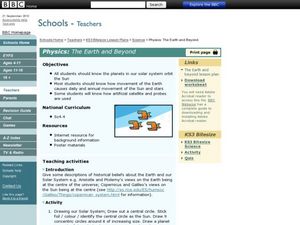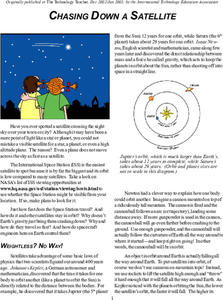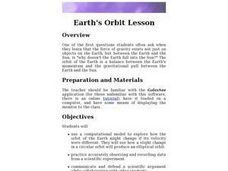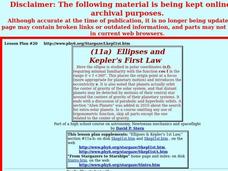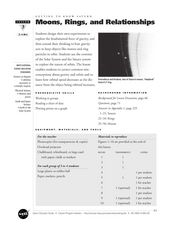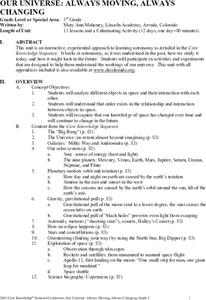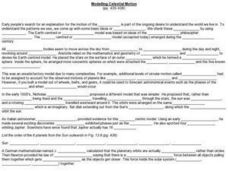Messenger Education
Give Me a Boost—How Gravity Assists Aid Space Exploration
The propellant needed for space explorations runs in the thousands, while paying to get the craft into orbit costs millions! In the second installment of three, two activities explore laws of conservation of energy and momentum. Using...
NASA
Blinded by the Light!
Pupils learn of multiple ways astronomers look for planets outside of the solar system. By completing a hands-on activity, scholars discover that trying to see the planets directly because of the glare from the nearby star is nearly...
Curated OER
WebQuest Solar System Colonization Project 2000
Sixth graders investigate the livability of different planets in the universe by researching and organizing information from a number of sources in this unit project. They decide on a location for a space station which they support in an...
Curated OER
Physics The Earth and Beyond
Fourth graders will explore our solar system. In this physics instructional activity students create a model of the solar system to explore the movement of Earth, the Sun, and stars.
Curated OER
Astronomy
In this astronomy worksheet, students read a detailed text about our solar system. Students then answer 15 questions about the information presented.
Curated OER
Astronomy
Students complete a unit of lessons on our solar system, its stars, and astronomers. They record information in a space journal, design constellations, define key vocabulary, observe the phases of the moon, and create a group planet...
Curated OER
Gravity Gets You Down
Students investigate the force of gravity and how it effects different objects that are put into acceleration when applied the experiment of free falling. They drop different objects that have a variety of masses and some that cause air...
Curated OER
Astronomy Test
In this astronomy test, middle schoolers answer 50 true/false and multiple choice questions about the relationships of the earth, moon, and sun. The test also includes questions about the solar system, galaxies, and the universe. An...
NASA
Chasing Down a Satellite
Calculate the speed of the International Space Station. By reading the article, pupils learn about the concept of orbits. Scholars work through a formula to determine how fast the International Space Station is traveling to stay in...
Curated OER
Solar System
Eighth graders identify the basic concepts of celestial bodies. They discover the difference between perihelion and aphelion and demonstrate how the universe is expanding. They also discover how gravity and centrifugal force are...
American Museum of Natural History
What is Astronomy?
Go study the universe. Pupils learn seven aspects about astronomy and astronomers. They begin to learn about constellations; distance and motion between objects; gravity; the electromagnetic spectrum; dark matter and energy; and teams of...
Glynn County School System
Light, History, Gravity, Distance, Relativity, and Space-Time
Let the star's color be the guide! The color of a star indicates its temperature and its mass and distance affect the gravitational force. The lesson presentations address these concepts as well as how the theory of special relativity...
Curated OER
Constellations
Middle schoolers explore the major constellations. After reviewing the Earth's basic motions and their significance, students discuss the moon's orbit and revolutions. Using a Digitarium Alpha portable planetarium projector, they...
Curated OER
Earth's Orbit Lesson
Tenth graders devise a computational model to explore how the orbit of the Earth might change if its velocity were different. Using accurately recorded data, 10th graders defend a scientific argument.
Curated OER
Ellipses and Kepler's First Law
The class examines graphs in the form r = F(¿¿) in polar coordinates (r, ¿¿), in particular with the circle, ellipse and other conic sections. They determine the nature of an ellipse by studying the role of the semimajor axis and...
Curated OER
Planetary Poster
Students engage in a study about the planets and create a poster as one of the projects during the study. They create individual charts for mapping the solar system so the locations can be found in mock space missions to other planets.
Curated OER
Is There a Tenth Planet?
For this planets worksheet, students read about how our solar system's planets were discovered and how scientist believe there might be a tenth planet. After reading, students complete 4 short answer questions.
Workforce Solutions
A Colony for Lunar Living
Two lessons explore the possibility of living on the moon. First, scholars read various scenarios to identify which careers would best transfer to life in space. Finally, pupils examine a website to locate items made for outer space,...
Curated OER
TE Activity: A Roundabout Way to Mars
Students investigate Hohmann orbit transfers using cardboard and string while focusing on the orbits of Earth and Mars. They look at the planets orbits around the sun and transfer orbit form one planet to another to determine what a...
Laboratory for Atmospheric and Space Physics
Looking to the Future
New Horizons set forth on a mission to Pluto in 2006. Ten years later, the spacecraft is still on its way. Here, enthusiastic scholars predict what they will be like—likes, dislikes, hobbies, etc.—when New Horizons arrives at its...
Curated OER
Getting to Know Saturn: Moons, Rings, and Relationships
Students identify the different objects that orbit Saturn. In this space science lesson, students plot the graph of orbital speed and distance. They explain why planets and asteroids remain in orbit around the sun.
Curated OER
Our Universe: Always Moving, Always Changing
Students explore the main concepts of astronomy through the eleven lessons of this unit. The past, present, and future methods of studying the science are examined in this unit.
Curated OER
Modeling Celestial Motion
In this modeling celestial motion instructional activity, students fill in the blank about the motion of celestial bodies: planets and stars. Students complete the blanks with information about the scientists and philosophers responsible...
Curated OER
Saturn’s Moons
Young scholars compare Saturn's moons to the Earth's moon. In this moon lesson students work in groups and complete a lab activity then answer questions.





